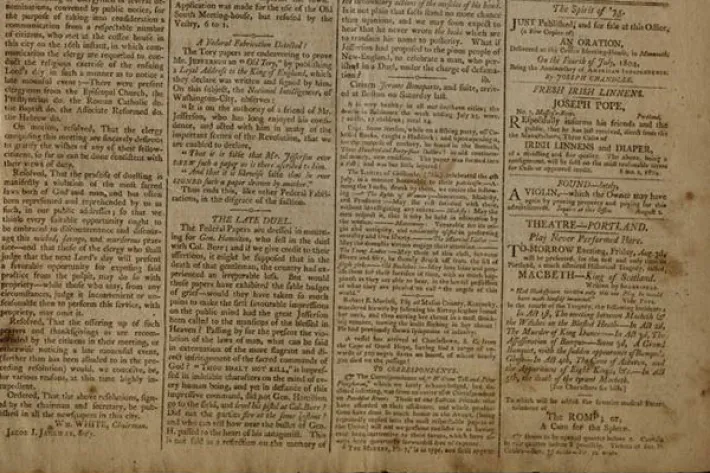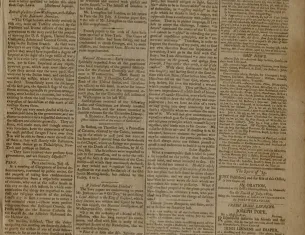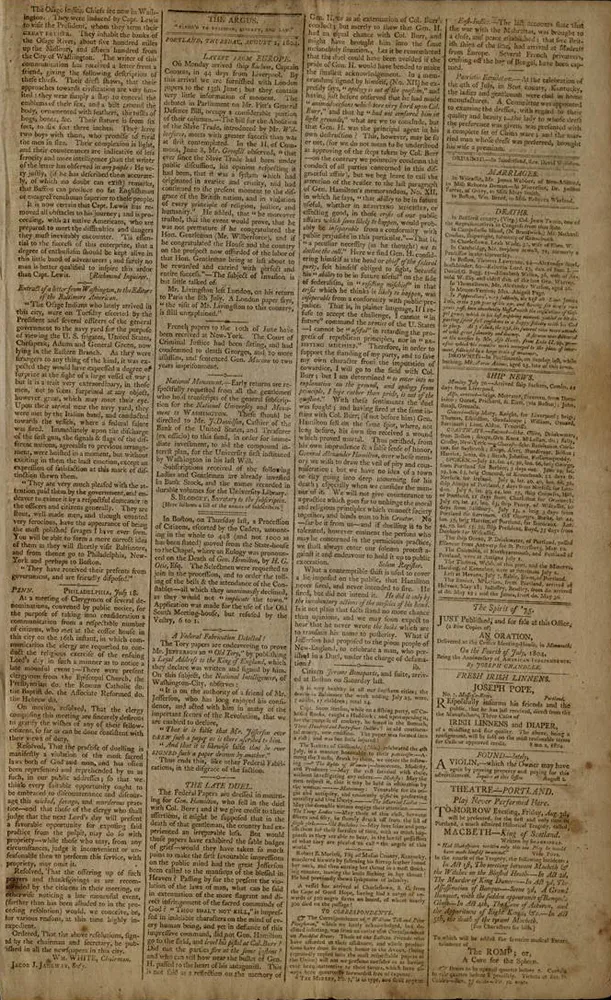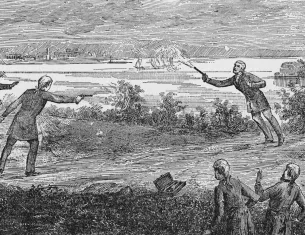Newspaper Account of the Duel, August 2, 1804

Eastern Argus, August 2, 1804 (The Gilder Lehrman Institute of American History)
This issue of the Eastern Argus, an Antifederalist newspaper, includes an article denouncing modern Federalists and an account of the July 11, 1804, duel between Aaron Burr and Alexander Hamilton. The Eastern Argus condemns the practice of dueling and asserts that because Hamilton willingly took part in the duel, he was not totally blameless in his own death.
“The Late Duel,” Eastern Argus, August 2, 1804
The Federal Papers are dressed in mourning for Gen. Hamilton, who fell in the duel with Col. Burr; and if we give credit to their assertions, it might be supposed that in the death of that gentleman, the country had experienced an irreparable loss. But would those papers have exhibited the sable badges of grief — would they have taken so much pains to make the first favourable impressions on the public mind had the great Jefferson been called to the masions of the blessed in Heaven? Passing by for the present the violation of the laws of man, what can be said in extenuation of the more flagrant and direct infringement of the sacred commands of God? “THOU SHALT NOT KILL,” is impressed in indelible characters on the mind of every human being, and yet in defiance of this impressive command, did not Gen. Hamilton go to the field, and level his pistol at Col. Burr? Did not he parties fire at the same instant? and who can tell how near the bullet of Gen. H. passed to the heart of his antagonist. This is not said as a reflection on the memory of Gen. H or as an extenuation of Col. Burr’s conduct; but merely to shew that Gen. H. had an equal chance with Col. Burr, and might have brought him into the same melancholy situation. Let it be remembered that the duel could have been avoided if the pride of Gen. H. would have bended to make the smallest acknowledgement. In a memorandum signed by himself, (No. XII) he expressly says “apology is out of the question” and having just before observed that he had made “animadversions which bore very hard upon Col. Burr,” and that he “had not censured him on light grounds,” what are we to conclude, but that Gen. H. was the principal agent in his own destruction? This, however, may be so or not, (for we do not mean to be understood as approving of the steps taken by Col. Burr — on the contrary we pointedly condemn the conduct of all parties concerned in this disgraceful affair), but we beg leave to call the attention of the reader to the last paragraph of Gen. Hamilton’s Memorandum, No. XII, in which he says, “that ability to be in the future useful, whether in RESISTING MISCHIEF, or effecting good, in those crisis of our public affairs which seem likely to happen, would probably be inseparable from a conformity with public prejudice in this particular.” — That is, “a peculiar necessity (as he thought) not to decline the call.” Here we find Gen. H. considering himself as the head or chief of the federal party, felt himself obliged to fight, because his “ability to be in future useful” on the side of federalism, in “resisting mischief” in that Crisis which he thinks is likely to happen, was inseperable from a conformity with public prejudice. That is, in plainer language, If I refuse to accept the challenge, I cannot “in future” command the armies of the U. States — I cannot be “useful” in retarding the progress of the republican principles, nor in “RESISTING MISCHIEF.” Therefore, in order to support the standing of my party, and to save my own character from the imputation of cowardice, I will go to the field with Col. Burr; but I am determined “to enter into no explanation on the ground, and apology from principle, I hope rather than pride, is out of the question.” With these sentiments the duel was fought; and having fired at the same instant with Col. Burr, (if not before him) Gen. Hamilton fell on the same spot, where, not long before, his own son received a wound which proved mortal. Thus perished, from his own imprudence & a false sense of honor, General Alexander Hamilton, over whose memory we wish to draw the veil of pity and commiseration; but we have no idea of a town or city going into deep mourning for his death; especially when we consider the manner of it. We will not give countenance to a practice which goes far to unhinge the moral and religious principles which connect society together, and binds man to his Creator. No — far be it from us – and if duelling is to be tolerated, however eminent the persons who may be concerned in the pernicious practice, we shall always enter our solemn protest against it and endeavour to hold it up to public execration.
Salem Register
What a contemptible shift is used to cover a lie imposed on the public, that Hamilton never fired, and never intended to fire. He fired, but did not intend it. He did it only by the involuntary actions of the muscles of his hand. Is it not plain that facts stand no more chance than opinions, and we may soon expect to hear that he never wrote the books which are to transmit his name to posterity. What if Jefferson had proposed to the pious people of New-England, to celebrate a man, who perished in a Duel, under the charge of defamation?
Source: “The Late Duel,” Eastern Argus, August 2, 1804, p. 3, The Gilder Lehrman Institute of American History, GLC08818.
“The Late Duel,” Eastern Argus, August 2, 1804
The Federal Papers are dressed in mourning for Gen. Hamilton, who fell in the duel with Col. Burr; and if we give credit to their assertions, it might be supposed that in the death of that gentleman, the country had experienced an irreparable loss . . . did not Gen. Hamilton go to the field, and level his pistol at Col. Burr? Did not he parties fire at the same instant?and who can tell how near the bullet of Gen. H. passed to the heart of his antagonist. This is not said as a reflection on the memory of Gen. H or as an extenuation of Col. Burr’s conduct; but merely to shew that Gen. H. had an equal chance with Col. Burr, and might have brought him into the same melancholy situation. Let it be remembered that the duel could have been avoided if the pride of Gen. H. would have bended to make the smallest acknowledgement . . . the duel was fought; and having fired at the same instant with Col. Burr, (if not before him) Gen. Hamilton fell on the same spot, where, not long before, his own son received a wound which proved mortal. Thus perished, from his own imprudence & a false sense of honor, General Alexander Hamilton, over whose memory we wish to draw the veil of pity and commiseration; but we have no idea of a town or city going into deep mourning for his death; especially when we consider the manner of it . . . if duelling is to be tolerated…we shall always enter our solemn protest against it . . .
Salem Register
What a contemptible shift is used to cover a lie imposed on the public, that Hamilton never fired, and never intended to fire. He fired, but did not intend it. He did it only by the involuntary actions of the muscles of his hand. Is it not plain that facts stand no more chance than opinions, and we may soon expect to hear that he never wrote the books which are to transmit his name to posterity.
Source: “The Late Duel,” Eastern Argus, August 2, 1804, p. 3, The Gilder Lehrman Institute of American History, GLC08818.
irreparable - impossible to repair
melancholy - sad
commiseration - sympathy for misfortunes of others
“The Late Duel,” Eastern Argus, August 2, 1804
. . . in the death of that gentleman, the country had experienced an irreparable loss. . . . Let it be remembered that the duel could have been avoided if the pride of Gen. H. would have bended to make the smallest acknowledgement. . . . Thus perished, from his own imprudence & a false sense of honor, General Alexander Hamilton, over whose memory we wish to draw the veil of pity and commiseration; but we have no idea of a town or city going into deep mourning for his death; especially when we consider the manner of it. . . . if duelling is to be tolerated . . . we shall always enter our solemn protest against it. . . .
Salem Register
Source: “The Late Duel,” Eastern Argus, August 2, 1804, p. 3, The Gilder Lehrman Institute of American History, GLC08818.
irreparable - impossible to repair
commiseration - sympathy for misfortunes of others
Background
This issue of the Eastern Argus, an Antifederalist newspaper, includes an article denouncing modern Federalists and an account of the July 11, 1804, duel between Aaron Burr and Alexander Hamilton. The Eastern Argus condemns the practice of dueling and asserts that because Hamilton willingly took part in the duel, he was not totally blameless in his own death.
Transcript
“The Late Duel,” Eastern Argus, August 2, 1804
The Federal Papers are dressed in mourning for Gen. Hamilton, who fell in the duel with Col. Burr; and if we give credit to their assertions, it might be supposed that in the death of that gentleman, the country had experienced an irreparable loss. But would those papers have exhibited the sable badges of grief — would they have taken so much pains to make the first favourable impressions on the public mind had the great Jefferson been called to the masions of the blessed in Heaven? Passing by for the present the violation of the laws of man, what can be said in extenuation of the more flagrant and direct infringement of the sacred commands of God? “THOU SHALT NOT KILL,” is impressed in indelible characters on the mind of every human being, and yet in defiance of this impressive command, did not Gen. Hamilton go to the field, and level his pistol at Col. Burr? Did not he parties fire at the same instant? and who can tell how near the bullet of Gen. H. passed to the heart of his antagonist. This is not said as a reflection on the memory of Gen. H or as an extenuation of Col. Burr’s conduct; but merely to shew that Gen. H. had an equal chance with Col. Burr, and might have brought him into the same melancholy situation. Let it be remembered that the duel could have been avoided if the pride of Gen. H. would have bended to make the smallest acknowledgement. In a memorandum signed by himself, (No. XII) he expressly says “apology is out of the question” and having just before observed that he had made “animadversions which bore very hard upon Col. Burr,” and that he “had not censured him on light grounds,” what are we to conclude, but that Gen. H. was the principal agent in his own destruction? This, however, may be so or not, (for we do not mean to be understood as approving of the steps taken by Col. Burr — on the contrary we pointedly condemn the conduct of all parties concerned in this disgraceful affair), but we beg leave to call the attention of the reader to the last paragraph of Gen. Hamilton’s Memorandum, No. XII, in which he says, “that ability to be in the future useful, whether in RESISTING MISCHIEF, or effecting good, in those crisis of our public affairs which seem likely to happen, would probably be inseparable from a conformity with public prejudice in this particular.” — That is, “a peculiar necessity (as he thought) not to decline the call.” Here we find Gen. H. considering himself as the head or chief of the federal party, felt himself obliged to fight, because his “ability to be in future useful” on the side of federalism, in “resisting mischief” in that Crisis which he thinks is likely to happen, was inseperable from a conformity with public prejudice. That is, in plainer language, If I refuse to accept the challenge, I cannot “in future” command the armies of the U. States — I cannot be “useful” in retarding the progress of the republican principles, nor in “RESISTING MISCHIEF.” Therefore, in order to support the standing of my party, and to save my own character from the imputation of cowardice, I will go to the field with Col. Burr; but I am determined “to enter into no explanation on the ground, and apology from principle, I hope rather than pride, is out of the question.” With these sentiments the duel was fought; and having fired at the same instant with Col. Burr, (if not before him) Gen. Hamilton fell on the same spot, where, not long before, his own son received a wound which proved mortal. Thus perished, from his own imprudence & a false sense of honor, General Alexander Hamilton, over whose memory we wish to draw the veil of pity and commiseration; but we have no idea of a town or city going into deep mourning for his death; especially when we consider the manner of it. We will not give countenance to a practice which goes far to unhinge the moral and religious principles which connect society together, and binds man to his Creator. No — far be it from us – and if duelling is to be tolerated, however eminent the persons who may be concerned in the pernicious practice, we shall always enter our solemn protest against it and endeavour to hold it up to public execration.
Salem Register
What a contemptible shift is used to cover a lie imposed on the public, that Hamilton never fired, and never intended to fire. He fired, but did not intend it. He did it only by the involuntary actions of the muscles of his hand. Is it not plain that facts stand no more chance than opinions, and we may soon expect to hear that he never wrote the books which are to transmit his name to posterity. What if Jefferson had proposed to the pious people of New-England, to celebrate a man, who perished in a Duel, under the charge of defamation?
Source: “The Late Duel,” Eastern Argus, August 2, 1804, p. 3, The Gilder Lehrman Institute of American History, GLC08818.
Excerpt
“The Late Duel,” Eastern Argus, August 2, 1804
The Federal Papers are dressed in mourning for Gen. Hamilton, who fell in the duel with Col. Burr; and if we give credit to their assertions, it might be supposed that in the death of that gentleman, the country had experienced an irreparable loss . . . did not Gen. Hamilton go to the field, and level his pistol at Col. Burr? Did not he parties fire at the same instant?and who can tell how near the bullet of Gen. H. passed to the heart of his antagonist. This is not said as a reflection on the memory of Gen. H or as an extenuation of Col. Burr’s conduct; but merely to shew that Gen. H. had an equal chance with Col. Burr, and might have brought him into the same melancholy situation. Let it be remembered that the duel could have been avoided if the pride of Gen. H. would have bended to make the smallest acknowledgement . . . the duel was fought; and having fired at the same instant with Col. Burr, (if not before him) Gen. Hamilton fell on the same spot, where, not long before, his own son received a wound which proved mortal. Thus perished, from his own imprudence & a false sense of honor, General Alexander Hamilton, over whose memory we wish to draw the veil of pity and commiseration; but we have no idea of a town or city going into deep mourning for his death; especially when we consider the manner of it . . . if duelling is to be tolerated…we shall always enter our solemn protest against it . . .
Salem Register
What a contemptible shift is used to cover a lie imposed on the public, that Hamilton never fired, and never intended to fire. He fired, but did not intend it. He did it only by the involuntary actions of the muscles of his hand. Is it not plain that facts stand no more chance than opinions, and we may soon expect to hear that he never wrote the books which are to transmit his name to posterity.
Source: “The Late Duel,” Eastern Argus, August 2, 1804, p. 3, The Gilder Lehrman Institute of American History, GLC08818.
irreparable - impossible to repair
melancholy - sad
commiseration - sympathy for misfortunes of others
Excerpt 100
“The Late Duel,” Eastern Argus, August 2, 1804
. . . in the death of that gentleman, the country had experienced an irreparable loss. . . . Let it be remembered that the duel could have been avoided if the pride of Gen. H. would have bended to make the smallest acknowledgement. . . . Thus perished, from his own imprudence & a false sense of honor, General Alexander Hamilton, over whose memory we wish to draw the veil of pity and commiseration; but we have no idea of a town or city going into deep mourning for his death; especially when we consider the manner of it. . . . if duelling is to be tolerated . . . we shall always enter our solemn protest against it. . . .
Salem Register
Source: “The Late Duel,” Eastern Argus, August 2, 1804, p. 3, The Gilder Lehrman Institute of American History, GLC08818.
irreparable - impossible to repair
commiseration - sympathy for misfortunes of others


